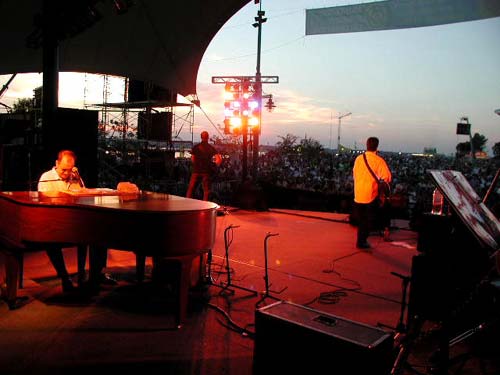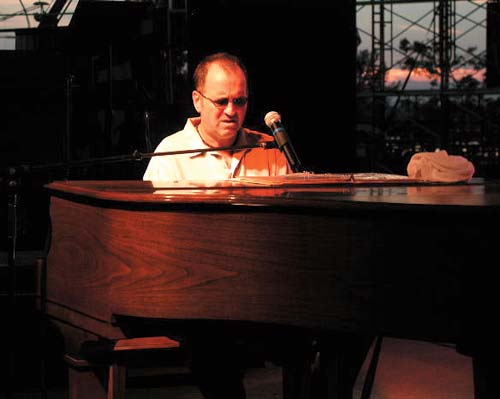Artist Interview: Player/Producer Gary W. Smith
At Home in Nashville
by Marsha Vdovin
 |
|
Gary W. Smith
|
Some people seem to be so connected to certain cities, as I am to my hometown: San Francisco. But sometimes people surprise you. For example, I have a friend who comes across as the consummate New Yorker but grew up in Cleveland. Another friend, a decidedly urban Goth, grew up in a small town in New Mexico. It always seems weird to me that Tom Waits is from Los Angeles. Sometimes, it seems, home is not where you were born, it's a place you're drawn to, the place you're supposed to be.
Gary W. Smith seems about as Nashville as they come: a career in country music, the accent, and that wonderful down-to-earth personality. So, I was surprised to learn that he comes from California...
I was born and raised in the San Joaquin Valley. Modesto is actually the place I was born. My dad is an Assembly God Preacher-a minister that pastored churches in Fresno. I just left home after I graduated with a gospel group going back to Nashville. My brother was already in the business; he was a musician and quite successful, and I so I wanted to follow in his footsteps. I got back to Nashville in '78 and never left.
So has Nashville been good to you?
Oh yeah! I toured pretty much right off the bat when I got here. I never really had to look for work.
I was a keyboard player and I toured with Barbara Mandrell for five years, and then I toured with Ricky Skaggs for about six years. I was on the Country Boy album, which was a huge success, and we won CMA band of the year in '84, '85 and 86. We also had two Grammys for instrumentals that we played, so that was a good run. Then I got married at that time to Christy Forester, one of Country Music's acclaimed Forester Sisters. So at that time I left Ricky and went on the road with them for a while and produced a record for them, and one day Dolly Parton called me. I went to L.A. to play on her television show, and then I became her musical director. I worked with her for about six years and produced the Eagle When She Flies album and Home for Christmas.
How did you make the transition from keyboard player to producer?
Well, it just happened. I guess it was a normal progression because as a piano player I did a lot of arranging. Dolly was the first one to step me up to producer. I was her musical director, and I was doing pretty much all of the arrangements out on tour. She was just really happy with the group that I assembled and said, " I want to take this group in and I want you to produce my next record." Of course, that was a really cool because I was about 33 or 34 and it was a major boost to my career.
 |
|
Gary Smith on piano, performing with Richard Marx
|
How exciting!
Yeah, especially since Eagle When She Flies was her first Platinum album that wasn't a 'best of' album ever. It was a really good thing for all of us.
It was great, but after a while having family and being on the road for so many years, it was time for me to step down and just do studio work. Since that time I've been recording with Faith Hill, Tim McGraw. I was on Seminal Wind, which was a pretty substantial record for me because I played the intro piano part. That project put me on the map as a player, so it was kind of easy to get work when I got off the road. I did several Randy Travis records. I played with Tim McGraw, Faith Hill, Patty Loveless, and a bunch of various artists. Since working with Dolly, I have produced some independent artists. I am first and foremost a studio musician. I've built a studio in my house that I use to produce artists.
Let's talk about your home studio
I have a control room and a studio room. In the control room, I have a Pro Tools LE system, a Mac G5, and my B3. I have a Yamaha Motif as my controller, and a Korg Trinity, and racks and racks of outboard gear. My latest UA gear is the LA-610 and UAD-1 card.
Do you have any favorite processors in the UAD-1?
My go-to is the 1176, and I use it a lot on drums. I'm very excited about the new Roland processors that are coming out because, as a keyboard player, one of my first things to have was a Fender Rhodes. I'm excited about getting some of that old gear back--virtually. I had a Dimension D that I gave to an engineer friend who mixed one of the Forester Sisters records for me. He used it on the acoustic guitar and it just sounded amazing. He just fell in love with it, and so I just kind of gave it to him, but I've been kicking myself ever since. I loved that unit. So I'm excited about the one you are making for the UAD-1.
I cut all my vocals on the LA-610. I got an Audio Technica 4060 mic, and I run it through the LA-610 and it sounds amazing.
How did you decide on the LA-610?
What had happened is a friend of mine owns a studio that I work with quite often, and he found a guy in Connecticut that had a deal on these, and they had just came out, and he bought one. I heard it at his studio, and he played his bass through it and it sounded amazing there. So I bought one too. Amazing. Each unit like that has their own kind of characteristics; you either just really love them or you don't. Each one of them has a little bit different color, but this channel strip is just amazing, I love it, I love it.
So you like to use it on vocals.
Bass and primarily vocals. Every mic pre has its own different color. I have some Focusrite mic pre's, and they sound brittle to me but this LA-610 is just so much warmer and it's got so much presence. I mean, it's the difference almost between cassette and CD. It's almost that much of a difference to me.
How do you use the UAD-1?
When I mix, I use the UAD plug-ins. But I like to record the vocals thru the LA-610 and rarely process them in the mix. We have been trained all our lives to know what sounds good and what doesn't, and once it sounds good to me I print it, I commit to it. That's the way I like to make records.
People that use Pro Tools have too many options. Pro Tools is a tool to me; it's not a way of recording. It's just a different format, that's all it is, and yes it is a tool and it's a wonderful thing to have all of this technology at our disposal, but sometimes it can be a negative in production; you have too many options.
People never finish things, and they mess with things too much.
Exactly. It's like you are never satisfied, you know? If you get it to where it is and you get it where you like it, just let it go man! The LA-610 does that vocally for me. I have used it on girls, I have used it on men, I have used it on this black artist that I am doing, and he's got a high-pitch kind of Phil Bailey thing and everything translates properly. I can use the same setup. I have got other microphones and other mic pre's, but this works on every single person who steps up to the mic. That's what I love about it. It works on everybody. I mean everything that I have run through it is just like, I go, "It's great, it's awesome, sounds wonderful to me."
Do you have any advice for up-and-coming musicians?
Just keep it real; don't try to fuss with it. When its right, let it go. You know when it's right. Don't try to overthink, and then they over play. It's not about how much you can play, it's like when you play it and how you apply it. Just trust your gut. Trust your gift.


